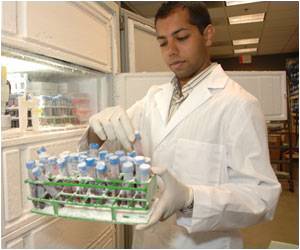Biofortified cassava high in iron and zinc can improve diets and health in West Africa. A new study suggests that field-grown cassava plants overexpressing a combination of plant genes can accumulate significantly higher concentrations of iron and zinc.

‘Biofortified cassava high in iron and zinc can improve diets and health in West Africa. A new study suggests that field-grown cassava plants overexpressing a combination of plant genes can accumulate significantly higher concentrations of iron and zinc.’





Iron deficiency anemia affects the immune system, stunts growth and impairs cognitive development in children, while deficiency in zinc causes increased the risk of death from diarrhea, stunting and reduced cognitive development.Developing new varieties of a staple food crop with elevated levels of these two minerals could significantly improve diets and health.
In a paper, "Biofortification of field-grown cassava by engineering expression of an iron transporter and ferritin," Donald Danforth Plant Science Center scientists, led by Narayanan Narayanan, Ph.D., research scientist, and Nigel Taylor, Ph.D., associate member and Dorothy J. King Distinguished Investigator, and an international team of researchers demonstrated that field-grown cassava plants overexpressing a combination of plant genes can accumulate significantly higher concentrations of both iron and zinc.
The elevated mineral levels of the 'biofortified' cassava storage roots are retained after processing into common foodstuffs and are nutritionally available at levels that could have a significant impact on the health of cassava-consuming populations in West Africa.
"This work showed us that it is possible to raise the iron and zinc content of cassava roots while maintaining yield and other plant characteristics that are important to farmers and consumers," Taylor said.
Advertisement
Ultimately it was a combination of two genes, IRT1 and FER1, from the model plant species Arabidopisis that led to cassava plants with iron concentration levels 6-12 times higher than conventional cassava and zinc concentrations that were 3-10 times higher.
Advertisement
To identify the impact of food processing on mineral levels in the biofortified cassava, researchers prepared gari and fufu, two common West African foods, by chopping, soaking, fermenting, pressing and roasting cassava. They found that high levels of iron and zinc were retained through these cooking processes and remained available for absorption in the gut following digestion. Ultimately the biofortified cassava could provide 40-50 percent of Estimated Average Requirements (EAR) for iron and 60-70 percent of EAR for zinc for children and women in West Africa.
"Biofortified cassava has the potential to improve the nutrition and health of millions of people in West Africa," said Taylor. "The higher iron and zinc would be present in every root harvested from these special plants, and therefore in every bite of food prepared from them."
Researchers in the VIRCA Plus project (cassavaplus.org) are now integrating the high iron and zinc trait into cassava varieties that are popular in Nigeria, with more field evaluations and assessments planned for 2019. Further development, testing and regulatory review are needed before iron and zinc biofortified cassava could be made available to farmers and consumers in the coming years.
Source-Eurekalert















